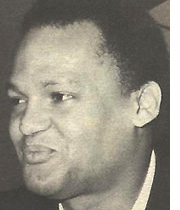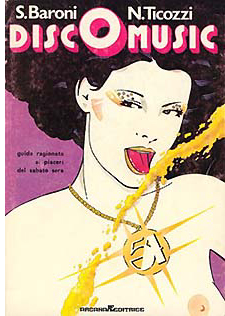Home
 Interviews
Interviews
 Jacques
Fred Petrus
Jacques
Fred Petrus
An
interview with Jacques Fred Petrus
By
Sandro Baroni and Nicola Ticozzi
 This
unique interview from 1979 gives a good picture of Petrus'
musical background, how he built his music empire and the
feelings around his and Mauro Malavasi's first two successful
years with their studio projects of Macho and Peter Jacques
band. Petrus are both thrilled and enthusiastic over the recognition
they reached but still unaware about what to come with the
even more successful creations of Change and B. B. & Q.
band. In that perspective this is a rare historical document
that highlights the very birth of a new era both on the Italian
and the rest of the worlds dance scenes, it is the birth of
global success of Goody Music/Little Macho productions!
This
unique interview from 1979 gives a good picture of Petrus'
musical background, how he built his music empire and the
feelings around his and Mauro Malavasi's first two successful
years with their studio projects of Macho and Peter Jacques
band. Petrus are both thrilled and enthusiastic over the recognition
they reached but still unaware about what to come with the
even more successful creations of Change and B. B. & Q.
band. In that perspective this is a rare historical document
that highlights the very birth of a new era both on the Italian
and the rest of the worlds dance scenes, it is the birth of
global success of Goody Music/Little Macho productions!
Interviewer:
When and how did the Disco Music arrive in Italy?
Petrus:
I would like to retrace my "evolution" in relation to the
world of Disco Music. As a young boy I was a record collector
and I owned all the released rhythm & blues and soul music
productions. Then I decided to exploit my music knowledge
and ten years ago I began to work as a DJ at the "Good Mood"
in Milan, a very good discotheque at that time. As soon as
I realized I could not keep on doing that kind of job for
the rest of my life, I started by importing records for discotheques
from the U.S.A., where I found a specialized firm. At first
the quantities were confined to a couple of packages per week,
mainly due to limited capital to be invested. The records
were just enough for me and a couple of DJ friends of mine
and the "commerce" was limited to a few discotheques (Nepentha,
Charly Max...), but it increased through the time. I also
began to sell records to a few discotheque fans, that were
thinking it should be snobbish to have at home such exclusive
records just released in the U.S.A. and known by a couple
of DJs only. Approximately six years ago I created the "Goody
Music" firm, the first one specialized in selling Disco Music
records. Two importers were already operating in Italy, Carù
and Ronchini in Parma, but they were not interested in this
genre, because it was such a difficult field. It was necessary
to be constantly informed about and knew the DJs tendency
and musical demands, then be able to choose and import the
only few good productions in a market flowing just like the
magma. At that time discotheques came back to an important
role and their interest in this initiative was remarkable,
because the DJs had not to be entrusted to the Italian record
companies any more but they finally could play the same records
that the U.S.A. "mythical" DJs used to.
Interviewer:
Which are the reasons why the Disco Music took root so well
in Italy?
Petrus:
In the beginning most people used to snub the Disco Music
both the record companies, that were sceptical about it, and
the young people, that enjoyed the pop/rock genre. Afterwards
it became much more important because the discotheques as
well as the private radio stations, were good advertising
veichles and effective introductory means. Young people went
to dance and listened to this kind of music for hours. As
we knew the recording market and the most effective promotional
means very well, when the first free radio station was born
in Milan we immediately supported it, by sponsoring some Disco
Music broadcasts. Other radio stations were born inspiring
themselves to those already existing. So the Disco Music broadcasts
covered up and overflowed the entire nation and the people
began to know and appreciate it. A genre of pure amusement
as the Disco Music has found a fruitful land, because young
people seemed to have less and less interests towards the
society problems. At the present time the lyrics of songwriter-singers
and rock bands talk about things of little interest. When
a young boy listens to a record or goes to a concert he wants
only to have fun and forget the every day problems.
Interviewer:
Why did you first concentrate your attention upon records
import and after upon Disco Music productions?
 Petrus:
Even when we used to import records only, we had a professional
and "industrial" working method. We first used to supply records
to our friends and then to radio stations and discotheques
of the whole Italy. Starting from a single record shop, we
finally built up a chain of shops. But we needed a "quality
jump", because it is in our intention to improve ourselves
continuously. In the beginning we totally controlled the market,
then competitors followed our footsteps, just like it happened
with the jeans production. A lot of little firms were born,
so the first ones, the best valued, began to realize other
clothing items, taking advantage of their experience and fame.
Now we have an inflation of records import and this activity
has taken a handicraft turn, because only few money is required
to open up a little shop where to sell records. To put into
practice this quality jump we needed solid foundations, so
we preferred to wait that all the elements could satisfy us.
We were looking for the musicians, the recording and mixing
studios, the producer and the most skilled technicians, because
we did not want to fail. We were not interested in a cheap
success, limited to our country only. We wanted to conquer
the international market. Finally, one year ago we started
our Goody Music productions with Macho (editor's note: "I'm
a man").
Petrus:
Even when we used to import records only, we had a professional
and "industrial" working method. We first used to supply records
to our friends and then to radio stations and discotheques
of the whole Italy. Starting from a single record shop, we
finally built up a chain of shops. But we needed a "quality
jump", because it is in our intention to improve ourselves
continuously. In the beginning we totally controlled the market,
then competitors followed our footsteps, just like it happened
with the jeans production. A lot of little firms were born,
so the first ones, the best valued, began to realize other
clothing items, taking advantage of their experience and fame.
Now we have an inflation of records import and this activity
has taken a handicraft turn, because only few money is required
to open up a little shop where to sell records. To put into
practice this quality jump we needed solid foundations, so
we preferred to wait that all the elements could satisfy us.
We were looking for the musicians, the recording and mixing
studios, the producer and the most skilled technicians, because
we did not want to fail. We were not interested in a cheap
success, limited to our country only. We wanted to conquer
the international market. Finally, one year ago we started
our Goody Music productions with Macho (editor's note: "I'm
a man").
Interviewer:
Macho and Peter Jacques Band are well known all around the
world. How did it happen?
Petrus:
To be sincere we were waiting for a positive feedback from
the market. The album "I'm a man" performed by the group "Macho"
has been the first record production all made by Italians,
with Italian musicians, that got an intercontinental success.
The album reached the fifth position in the "U.S.A. Disco
Charts" and the first positions in Japan, Europe, Brazil and
Argentina. We had focused our attention on all the elements
and carefully pursued Mauro Malavasi, that seemed to possess
all the characteristics to become one of the best valued producers
in the world. He needed the means and we gave them to him,
regardless of the expense. The mixing were made in the best
Disco Music studios in the world: the mythical "Sigma Sound
Studio" in New York. "Fire Night Dance" performed by the Peter
Jacques Band was another smash hit. It was our intention to
demonstrate to the international scene that our successes
were not casual but they were the result of accurate and serious
record policies. The U.S.A. recording managers were shocked
by two records in the chart produced by a little record company.
Two records made by Italian musicians, co-ordinated by an
Italian producer! There is still scepticism abroad with regard
to the "made in Italy".
Interviewer:
In the Disco Music market it is really important the time
range elapsing between the record release and the beginning
of its eventual charts scaling. How things went for your records?
Petrus:
Our two record productions immediately reached the top of
the charts. Macho was quite an incredible phenomenon: three
weeks later the release it reached the fifth position, whereas
Donna Summer, for example, reached the fifth position too,
but she took more than twice the time. At the moment Peter
Jacques Band has reached the sixth position. The point is
that the first twenty records are very good productions, so
variations are a little bit slower and with "suffering".
Interviewer:
Which is the working method used at Goody Music?
Petrus:
In our record productions you may find the experience of an
import firm that has been in touch with the world-wide Disco
Music productions for many years. We know the music for discotheques
deeply as well as the DJs demands. A continuous contact with
the record buyers taught us what people enjoy more: if the
melody, the lyrics or the rhythm. So we knew exactly what
the audience was looking for and we made it. We have not the
spirit of the musician asserting: "I want to make a record
according to my own musical taste. I have the right ideas
and the others do not understand anything". Three hundred
millions lire (editor's note: the "lira" is the obsolete Italian
guilder) can also be spent to make a record. You imagine it
as a masterpiece, but the audience refuses it because the
record has not been made according to his taste.
Interviewer:
Which are the peculiar characteristics of a Disco Music hit?
Petrus:
At the present time the rhythm alone cannot give the success.
The market is in a continuous development and an incredible
amount of records is released. You just have to think that
Billboard made its Disco Chart longer by adding twenty positions,
because we have lots of smash hits and it is necessary to
be different in this sea of vinyl. People, right now, want
the melodies, wish to listen to "beautiful" things that can
be easily remembered. They must be able to whistle the music
heard at the discotheque or on the radio. The audience wants
to be more participating. At the moment the melodies, more
than the rhythm, are necessary to the Disco Music, because
words and catchy tunes first of all affect people's mind.
 Original
Italian version
Original
Italian version
Taken
from the Italian booklet Disco Music
(a reasoned guide to the Saturday night pleasures)
Published by: Arcana editrice (Rome, 1979)
Special
thanks to Paolo Caroselli for supplying and translating
the JFP interview.